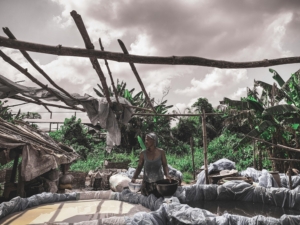Gender-Inclusive Pathways for Poverty Reduction in Nigeria
 According to the World Bank, by the end of 2024, 40.7% of Nigerians are expected to live below the international poverty line of $2.15 per day. In October 2021, the Policy Innovation Center (PIC) was created to promote better policy-making in Nigeria. PIC is Africa’s first national initiative aimed at helping governments and organizations make better decisions through behavioral insights and evidence-based solutions. Each year, it hosts the Gender and Inclusion Summit to promote gender equality and inclusive governance in Africa.
According to the World Bank, by the end of 2024, 40.7% of Nigerians are expected to live below the international poverty line of $2.15 per day. In October 2021, the Policy Innovation Center (PIC) was created to promote better policy-making in Nigeria. PIC is Africa’s first national initiative aimed at helping governments and organizations make better decisions through behavioral insights and evidence-based solutions. Each year, it hosts the Gender and Inclusion Summit to promote gender equality and inclusive governance in Africa.
PIC’s 2024 Summit
The 2024 summit (GS-24) took place on September 4 and 5 under the theme, “Reimagining Gender-Inclusive Pathways and Partnerships for Poverty Reduction.” The event focused on poverty reduction through gender-inclusive strategies, bringing together policymakers, stakeholders and organizations to influence national policy reforms and address issues like health, education and living standards.
The summit highlighted how gender equality is essential for economic growth, improved health and community well-being, emphasizing gender inclusion as a foundation for broader development goals. Its nine primary objectives, the Summit Tracks, provide a framework for gender-inclusive policies contributing to poverty reduction. They also align with the United Nations’ 2030 Agenda for Sustainable Development through its Sustainable Development Goals (SDGs) for global peace and prosperity. Here are the four main summit tracks focused on poverty reduction in Nigeria.
Equitable Access to Health Care
According to the BMC Health Services Research, women in Nigeria have significant barriers to health care access. In 2021, 60% of providers believed women could not choose family planning methods without a male partner’s presence, while 23.2% thought unmarried clients should not use these services. With harmful practices occurring in 59.6% of deliveries, “Equitable Access to Health Care” is crucial.
The goal is to ensure gender-sensitive health care systems that improve community well-being. By focusing on this issue, PIC is working on inclusive policies that will enhance health care delivery and reduce health disparities – fighting “heath-related” poverty and aligning its work with SDG 3, “Good Health and Well-Being,” SDG 10, “Reduced Inequalities” and SDG 17, “Partnerships for the Goals.”
Educational Equity
Gender inequalities heavily affect the Nigerian population, with one in seven needy individuals – 19.1 million – living in households where a man has completed primary school, but no woman has. In 2022, more than 50% of girls were out of school at the elementary level, showcasing the importance of this second pillar’s emphasis on equal access to quality education. Indeed, the vision of education as a key driver of poverty reduction aligns with SDG 4, “Quality Education,” SDG 5, “Gender Equality,” and SDG 17, “Partnerships for the Goals.”
Advancing Gender Equity in Water, Sanitation and Hygiene
Nigeria is improving its Water, Sanitation and Hygiene (WASH) access, with 70% of people having drinking water, according to the Nigeria Multidimensional Poverty Index 2022. However, the amount and quality of water remain below the standard. Each person gets an average of nine liters daily when the recommended minimum is 12 to 16 liters.
Thus, to advance poverty reduction in Nigeria working on strategies to stop gender inequality in WASH services in needed. While women mainly handle household water, sanitation and hygiene in Nigeria, when these services are lacking, they often face extra burdens, including health risks, safety concerns and emotional stress and are without control over household decision-making. Work on this Summit track matches SDG 5, “Gender Equality,” SDG 6, “Clean Water and Sanitation” and SDG 17, “Partnerships for the Goals.”
Creating Secure Livelihoods and Decent Jobs for All
In 2022, 84.9% of women in Nigeria were in vulnerable employment and the labor force participation rate among females was 52.2% compared to 65.9% for men in 2023. Workers in vulnerable jobs lack formal contracts and social protection, making them more likely to fall into poverty. Furthermore, the labor force participation rate among females is 52.2% and among males is 65.9% for 2023.
The last point focuses on developing stable and secure employment opportunities while enhancing female economic empowerment. This point is linked with SDG 5, “Gender Equality,” SDG 8, “Decent Work and Economic Growth” and SDG 10, “Reduced Inequalities.”
Final Remark
The 2024 Gender and Inclusion Summit on “Reimagining Gender-Inclusive Pathways and Partnerships for Poverty Reduction” was centered on tackling gender inequality and poverty in Nigeria. By addressing health care, education, WASH access and secure jobs through its Summit Tracks, the event highlighted various ways to create a more inclusive society.
PIC’s efforts align with important Sustainable Development Goals and aim to drive policy changes that address the root causes of poverty. Indeed, as Nigeria faces considerable challenges with poverty and inequality, these gender-inclusive strategies are crucial for building a fairer and more prosperous future for all.
– Alissa Naydenova
Alissa is based in Colchester, Essex, UK and focuses on Good News and Politics for The Borgen Project.
Photo: Pexels
